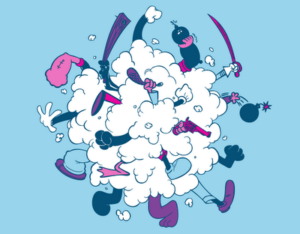
Ok, after a great episode that was weak on sex and violence we’re back with blood flying. This one opens up not just with a disembowelling but a decapitation. Awesome. This time it’s somebody we know – the fat guy from a few previous episodes who was captured and tortured. And this time we see Southwell in the audience praying for his soul. This does not sit well with Marcus, whose son was busted by Topcliffe last week.
I don’t get most of this episode. There’s very little Shakespeare in it. Their friend Autolycus – who is part of the storyline so infrequently that I would forget his name were it not for the reference to the text – has a new girlfriend. Which ends up with him getting plague. How that happens? I don’t know.
But he ends up in a plague house, which basically means he’s dead. But a twist! Burbage can’t let him go alone, so agrees to be boarded up in a plague house with him. What? Did that actually happen? We know he’s not going to die, so I’m not sure what the writers are getting at with this little side trip.
Shakespeare has an idea – he’s going to write a story exposing the Queen’s torturer Topcliffe. That play? Richard III.
Shakespeare learns that Southwell now has Alice Burbage on his side as well, which gets them (Shakespeare and Southwell) into an argument since Shakespeare sees it as putting Alice in harm’s way, while Southwell is
starting to be shown as a bit of a nut who cares only about people’s eternal spirit and is thus not troubled by people being captured and tortured.
Best line of the night? Alice says that Shakespeare’s offering nothing of value to the world because who cares about Henry VI Parts 1, 2, 3. He swears that he is working on a play of such greatness… to which she responds, “What, part 4? Does it have a funny dog?” Ouch.
Marlowe is still his typical atheist self. Having failed to meet the devil he
wants to see Southwell, to meet god. We know how that’s going to go.
It’s clear that the story is racing toward some conclusions, but that also means focusing on the story that they’ve been telling, rather than Shakespeare’s biography. So you know how I’m going to feel about that. I get it, I get why it’s necessary. I’m just not all that interested in it. An episode like this is in the background while I do other things.
Let’s see what the next episode has for us! There’s only ten I’m told, so whatever’s going to happen is going to happen soon.


 Ok we’re heading toward a big finish and lots of plots are moving forward.
Ok we’re heading toward a big finish and lots of plots are moving forward.